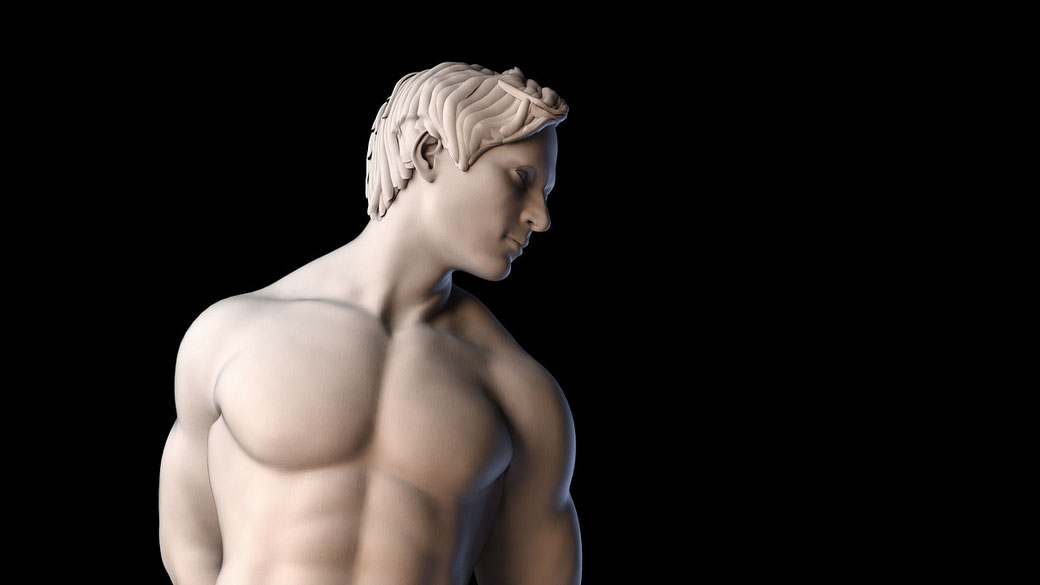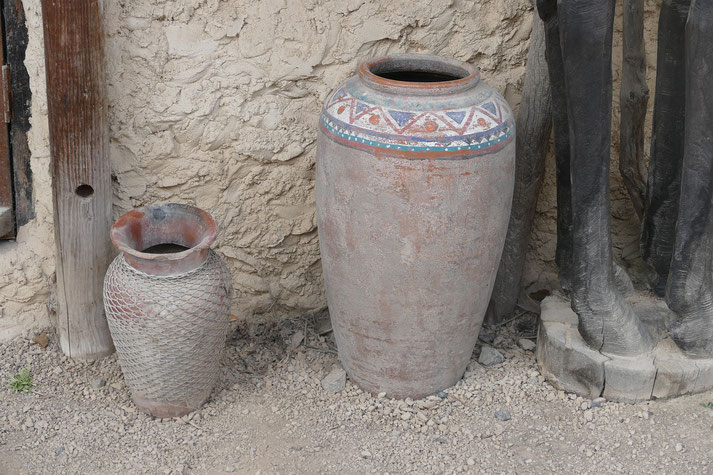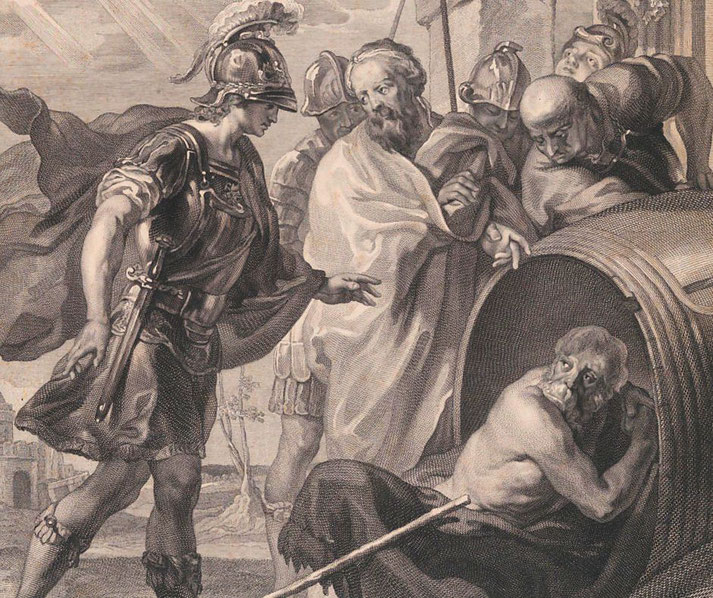Diogenes: the crazy, nudist Greek philosopher who insulted Alexander the Great

He lived in a large clay jar, wandered barefoot through crowded streets, and barked at anyone who annoyed him. What is even more amazing is that when the powerful Alexander the Great approached him, he simply asked only that the king move out of his sunlight.
This was the strange man known as Diogenes of Sinope.
Who was Diogenes?
In the late 5th century BCE, Diogenes was born in Sinope, a Greek colony located on the southern coast of the Black Sea.
His father was known as Hicesias and he worked as a banker that became connected to a scandal involving the corruption of coinage.
Ancient accounts differ on whether Hicesias and his whole family was punished or whether Diogenes alone left Sinope, but his father's crimes led him toward a life that rejected material wealth and social respectability.
Some sources suggest that Diogenes himself took part in the act of damaging the coins, and he later claimed that just as coins could be corrupted, so too could the values of society.
Nevertheless, upon arriving in Athens, Diogenese found himself surrounded by schools of thought that had been inspired by Socrates.
Rather than join their ranks, he sought out Antisthenes, a former student of Socrates who believed that virtue required rejection of comfort and indulgence.
Diogenes adopted these teachings with greater intensity than any other follower and dedicated himself to testing them in daily life.
Under Antisthenes’ influence, Diogenes refused to engage in the political and civic life of Athens.
He saw public office, honour, and reputation as traps that kept people enslaved to the approval of others.
Instead of using words to explain his beliefs, he allowed his conduct to be his argument.
He aimed to expose the absurdity of common customs by refusing to follow them.
What did Diogenes believe?
According to Diogenes, people ruined their lives with pointless desires. He insisted that humans should follow nature rather than obey man-made laws.
He said that hunger, cold, discomfort, and shame represented false ideas created by habit and vanity rather than real problems.
In his view, real happiness came from needing less.
In contrast to other philosophers, he did not build a system of ideas, but he refused to write down his thoughts or lecture in public halls.
His goal was to live with complete independence and to remain unaffected by praise, criticism, pain, or loss.
That ideal, which he called autarkeia, formed the real basis of his philosophy.
Among Diogenes’ strongest beliefs was that freedom could not exist alongside dependency.
He argued that those who needed servants, luxuries, or the approval of others had become slaves in their own lives.
A Cynic, in his terms, should be self-governing and shameless, guided only by reason and instinct.
The term "Cynic" itself derived from the Greek word kynikos, meaning "dog-like," which Diogenes embraced to emphasise his desire to live in accordance with nature.
In many respects, Diogenes aimed to shock people into thinking more deeply about their lives.
He knew that respectable citizens would never listen to sermons about hypocrisy, so he chose instead to act in ways that exposed their contradictions.
Diogenes' peculiar behaviours
During his life in Athens and later Corinth, Diogenes slept in a pithos (a very large, thick-walled ceramic storage jar used extensively throughout the ancient Mediterranean) in the marketplace, wore the same cloak every day, and owned little more than a wooden staff.
He begged for food without embarrassment and responded to charity with ridicule.
At times, he walked through the streets during the day and carried a lamp. When asked what he was doing, he answered that he was searching for an "honest man". He never found one.
That performance criticised the dishonesty he believed poisoned social life in every class.
On several occasions, he used his wit to humiliate other philosophers. When Plato defined man as a “featherless biped,” Diogenes plucked a chicken and brought it to the Academy, saying, “Here is Plato’s man.”
His mockery did not stop with Plato. He insulted crowds, heckled public figures, and laughed at some of Athens' most sacred traditions.
He once discarded his only cup after watching a boy drink water with his hands, declaring that he had discovered someone with fewer needs than himself.
He relieved himself in public and even masturbated in the marketplace, and he said that he wished it were just as easy to relieve hunger by rubbing his stomach.
He often compared himself to a dog, which lived without fear and falsehood.
Among his most offensive habits was his habit of barking at people who disturbed him. H
e claimed this kept them away better than reason ever could. His critics called him a madman. His followers called him the only sane person left on earth.

When Diogenes met Alexander the Great
During one of Alexander the Great’s visits to Corinth after becoming king in 336 BCE, the ruler asked to meet the famous philosopher.
Word had reached him of a man who feared no one and wanted nothing. The king approached while Diogenes lay sunbathing in a public square.
According to tradition, Alexander introduced himself and asked if he could offer any favour.
Diogenes looked at him and said, “Yes. Stand out of my sunlight.” That reply stunned everyone present.
Yet Alexander, rather than becoming angry, admired his honesty. He reportedly said, “If I were not Alexander, I would wish to be Diogenes.”
Ancient accounts, such as those found in Diogenes Laertius' Lives of Eminent Philosophers, recorded the details of this meeting as a kind of philosophical parable.
In that brief exchange, Diogenes demonstrated that he had no desire for wealth, power, or royal attention.
He did not flatter kings. He treated them as equals or worse. For him, the only greatness worth pursuing was the kind that freed a person from dependence.
Among later writers, the story became a symbol of courage, as it showed that a man with nothing could have greater freedom than a man who ruled the world.
Diogenes, lying in the sun, had what Alexander could not give him.

The philosopher's legacy
After Diogenes’ death, traditionally placed around 323 BCE, his name lived on as a representation of radical defiance.
The exact manner of his death remain uncertain, with ancient rumours claiming illness, or from intentionally holding his breath too long, eating raw octopus, or even a dog bite.
Regardless of the specific cause, the facts mattered less than the impression he left behind.
Later Cynics spread his teachings across the Greek world after following his example. Crates of Thebes, one of his disciples, abandoned his fortune to live as Diogenes had.
Crates influenced Zeno of Citium, who also drew on other teachers and traditions when founding the Stoic school.
Although Stoicism took a more disciplined approach, it inherited Diogenes’ belief in self-control and moral independence.
In later centuries, Diogenes' name became shorthand for the person who tells hard truths and refuses to bow to convention.
Artists often showed him holding a lantern in daylight, still looking for one honest man, while he also appeared in the works of thinkers such as Montaigne and Nietzsche, who admired his rejection of social lies and his pursuit of individual truth.
Among modern thinkers, his appeal lies in his total rejection of lies. He did not try to reform society. He just refused to obey it.
His madness, whether real or performed, forced others to ask what they truly needed.
He humiliated the proud, exposed the pretentious, and, of all ancient philosophers, he lived most completely by his own rules.
What do you need help with?
Download ready-to-use digital learning resources
Copyright © History Skills 2014-2025.
Contact via email
With the exception of links to external sites, some historical sources and extracts from specific publications, all content on this website is copyrighted by History Skills. This content may not be copied, republished or redistributed without written permission from the website creator. Please use the Contact page to obtain relevant permission.





